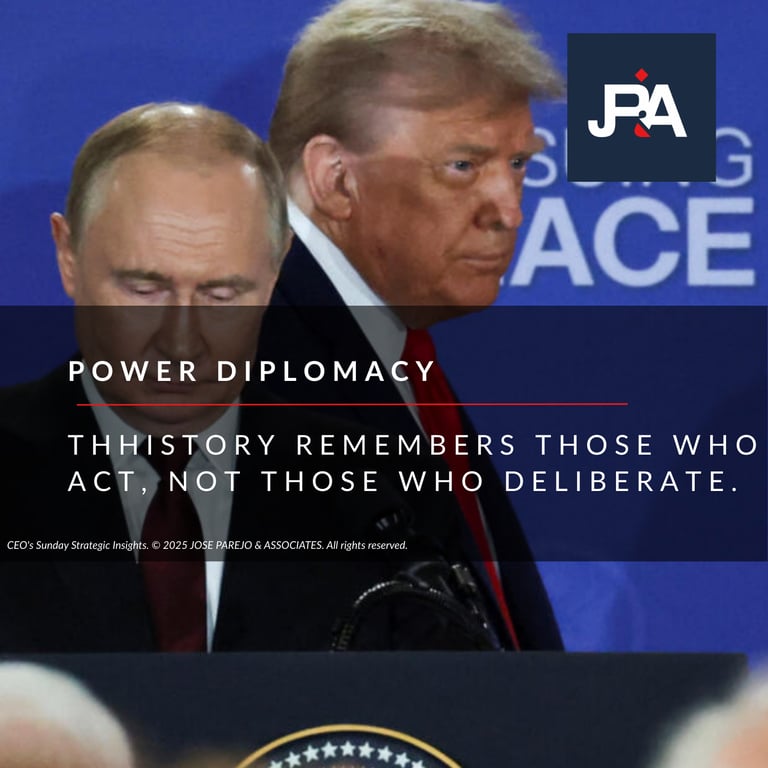

Aug 16, 2025. When institutions falter, decisive powers redraw the map.
Sunday CEO Strategic Insights
Where Geopolitical Analysis Meets Strategic Vision
By José Parejo, Founding Partner
Reflections on Power, Diplomacy, and Strategic Foresight
The Alaska Precedent: When Bilateral Engagement Bypasses Institutional Gridlock
By José Parejo, Founding Partner, José Parejo & Associates
The Alaska summit was not merely another diplomatic encounter. It marked the re-emergence of a political architecture older than NATO or the United Nations: post-institutional diplomacy, the direct engagement of principal powers when multilateral frameworks collapse under their own weight. Whether this proves stabilizing or destabilizing, the precedent has been set.
History has witnessed this pattern before. Metternich rebuilt Europe after Napoleon by removing the Holy Alliance from the table and reducing diplomacy to its essential actors. Kissinger did the same in 1971 when he bypassed the Soviet Union and opened the secret Beijing channel. Reagan, in his dialogue with Gorbachev, transcended the Soviet institutional façade through personal channels that achieved what collective bureaucracies could not. In Alaska, the same structural logic reappeared: when institutions paralyze, those willing to act directly shape events.
The logic was not confined to Ukraine, though Ukraine remains the battlefield where this logic is tested most cruelly. Trump’s calculation was directed at China. Every hour spent by Putin in Alaska was an hour not spent consolidating Moscow’s coordination with Beijing. Every bilateral channel established with Washington introduced the possibility of fissures in the axis that has defined Eurasian geopolitics since 2019. This was classical wedge strategy, as old as Thucydides, designed not to contain adversaries simultaneously but to prise them apart.
The exclusion of Europe revealed not discourtesy but structure. A committee-driven, consensus-dependent political culture cannot keep pace with crises whose timelines demand immediate resolution. Power flows toward actors who can act decisively; Europe deliberates, others decide.
The deeper battlefield is time. Every month of continued war erodes Europe’s industrial competitiveness. Every month prolongs American strategic advantage in energy and defense. Every month consolidates Russian territorial control, even as it exposes Moscow’s failure to achieve its original objectives. And every month forces Ukraine—the true victim of aggression—to survive by patience and resilience, enduring a war in which the invader has already lost what it sought to gain.
Critics dismiss Alaska as failed diplomacy. The same was said of Camp David in 1978, where Carter bypassed the Arab League, ignored European advice, and defied the United Nations. That “failure” produced the most enduring peace in the modern Middle East. Direct engagement between principals achieves what institutions cannot, because institutions are designed for process, not resolution.
Putin’s invitation—“next time in Moscow”—was not courtesy but a test. Should Washington accept, the world will witness the formal debut of what may be called Principal Power Diplomacy: governance by those with the capacity to enforce decisions rather than those with the institutional authority to deliberate them. Should it decline, it will reveal the enduring constraints of domestic politics upon strategic flexibility. Either choice alters the architecture of the system.
At its deepest level, Alaska represents the collision between Nietzschean will and Kantian process. Europe, in its devotion to universal frameworks and procedural legitimacy, embodies the Kantian tradition. The United States, by testing direct strategic will, revived the older and harsher realism of Machiavelli, Clausewitz, and Bismarck. This is not moral relativism but structural recognition: history is shaped not by what should occur according to rules, but by what does occur when powers act on capability and resolve.
The lesson for strategic planners is severe. Direct channels will increasingly bypass institutional consultation when rapid adjustment is demanded. Proximity to principal powers will matter more than institutional membership. Above all, the speed of adaptation will determine survival in a system where processes lag behind crises.
Alaska will not be remembered for the ceasefire it failed to deliver. It will be remembered for inaugurating a precedent: that twenty-first-century crises may no longer be managed by the institutional order of 1945, but by the will of those capable of acting outside it. For Ukraine, this means enduring tragedy while great powers test new architectures. For Europe, it means confronting irrelevance born not of weakness but of process. For the world, it may mean that the age of institutional diplomacy is closing, and a harsher form of governance is taking its place.
— José Parejo
Founding Partner, José Parejo & Associates
Sunday CEO Strategic Insights | August 17, 2025
Strategic Foresight. Confidential Intelligence. Global Perspective.
© 2025 José Parejo & Associates. All Rights Reserved.
Strategic Services & Risk Intelligence (EN) Independent Citations.
Insights / Frameworks / Strategic Intelligence: Global Strategic Intelligence 50 – Board-Level Framework (2026)
© 2025 JPA — Jose Parejo & Associates. All rights reserved. Presencia en plataformas: Enterprise League
